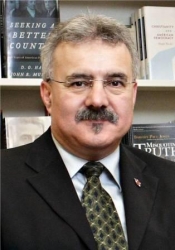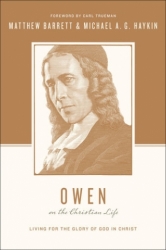Welcome once again to Books At a Glance as we sketch out the Protestant Reformation of the sixteenth century about five minutes at a time. I’m Fred Zaspel, and Dr. Michael Haykin is talking to us one more time about the magisterial Reformer, John Calvin, and today addressing the question of Calvin and Reformation missions.
Zaspel:
Michael, it is often alleged that the Reformers were not missions-minded. Would you like to disabuse us of that notion?
Haykin:
Yes. That’s a common charge. You find it often in histories of missions. Some missiologists and missiological historians make the charge. It’s an old charge; it’s not new; it’s one that goes all the way back to the late 16th century. Robert Bellarmine, the Roman Catholic controversialist and theologian, argued that while Roman Catholicism displayed a missionary passion and therefore he understood this to be a mark of a true church, the Reformers did not. He could say, for instance, of the Lutherans, “The Lutherans compare themselves to the apostles, the evangelists; yet, though they have among them a very large number of Jews, and in Poland and Hungary, the Turks, though they are near neighbors, they’ve hardly converted so much as a mere handful.”
The charge that the Reformers were not mission-minded – that sort of statement really fails to take into consideration a number of things. Number one – the complexity of the major Protestant bodies, the complex situation in which the major Protestant bodies found themselves. Neither Germany nor Switzerland possessed significant naval or maritime resources to take the Gospel outside of the bounds of Europe. Bellarmine would refer to the Iberian kingdoms of Spain and Portugal, who were deeply involved in transatlantic imperialist ventures and at the same time with their priests going hand-in-hand with them. And Bellarmine would point to these as missions endeavors. But from our vantage point, their missionary endeavors are often indistinguishable from imperialism and imperialistic conquests. It is very noteworthy that other Roman Catholic nations like Poland that lack seagoing capabilities evidenced as little (if you want to talk about it that way) cross-cultural missionary concerns as did, say, the German Lutherans or the Reformers in Zürich.
So, it’s simply wrong to say that the Reformers had no missions consciousness. If they did have it, which I would argue that they did, it was very difficult for them to put anything like this into practice. They just didn’t have the resources. And then, most importantly, and the Roman Catholic is not going to view it this way, necessarily, but when Calvin looked across Europe, he did not see a Christian continent. What he saw at best was sub- Christian, at worst Pagan. He could say of Europe in his day, “The light of divine truth has been extinguished; the Word of God has been buried; the virtue of Christ left in profound oblivion; the pastoral office subverted; and impiety is so stalked abroad that almost no doctrine of religion is pure from admixture, no ceremony free from error, no part of or minute of divine worship untarnished by superstition.” And so, if you asked the Reformers, “Do you have a concern for missions?” If, by that you mean do they have a concern for the salvation of men and women who were outside of Christ, their answer would be, “Yes.” The vast bulk of them, in their minds, were to be found in Europe. They had a missionary passion, but it was re-Christianizing, as it were, the European nations.
Zaspel:
Yes, so it was an evangelistic emphasis, but not necessarily cross-cultural, and they would have targeted Roman Catholics, for that matter; and certainly the Roman Catholics would not want to acknowledge that as legitimate mission.
Haykin:
Right.
Zaspel:
How does Calvin show us a true missions-mindedness?
Haykin:
There’s a number of ways. You see it in his overall thought, that the kingdom of Christ is advancing through the world. You could talk, for instance, in his preface to his Institutes, which he addressed to Francis I, the king of France, that God has appointed Christ to “rule from sea to sea, from the rivers even to the ends of the earth.” It’s a biblical statement, but he applies it missiologically. Calvin could say the reason the spirit came down at Pentecost, one of the reasons anyway, was the Gospel might reach “all the ends and extremities of the world.” Or, again, preaching on 1 Timothy 2, Calvin could say Christ came not simply to save a few, but “to extend his grace over all the world.”
Then there is this kind of global prospective that Calvin had. You actually hear it in his prayers. It’s very interesting, in an earlier episode, I mentioned about Denis Raguenier being appointed by the company of elders in Geneva to transcribe all of Calvin’s sermons. Now, at the end of his sermon, which usually lasted about 40 minutes, Calvin would say something like, “Now let us turn to the Lord.” At that point the sermon was over. If you’d been listening you would have known that by the way that he brought all things together into a conclusion, but it was a formal ending of the sermon, “Now let us turn to the Lord,” in which he would now pray. And Denis Raguenier should have put down his pen in one sense, at that point, but he didn’t, he kept writing. And so, we have this fabulous body of prayers of Calvin’s. They were extemporaneous; they were not written prayers. And you hear Calvin, in many of them, praying that the Gospel or the teaching he is giving in Geneva might indeed go to the ends of the earth. And so, you have both, in terms of his thinking, but also in the way that that thinking was fleshed out in his public prayer life in leading worship, this concern for the nations and for the Gospel to go to the nations.
Zaspel:
You have a book on this subject—To the Ends of the Earth: Calvin’s Missional Vision and Legacy—can you tell us about it just briefly? Maybe a quick overview?
Haykin:
This issue, I think, is a very important one, especially because of the charge that the Reformers were not missiologically minded. Jeff Robinson, one of my colleagues at Southern, a PhD student there, who works now for the Gospel coalition, and I came up with the idea of writing a response to this kind of error of thinking about Calvin. It involved us in looking at Calvin’s thought, in terms of things I have already mentioned; but also looking at his exposition of biblical passages that are frequently used to support missions. And then looking at his legacy, his legacy in the Puritans, in 18th century Calvinists like Jonathan Edwards, Andrew Fuller, and so on, and seeing how Calvin and Calvinism are indeed imbued with a deep sense of mission and evangelism.
Zaspel:
We’re talking to Dr. Michael Haykin, Professor of Church History at The Southern Baptist Theological Seminary. You’ll want to check out this and other of his books here on this page, especially here his To the Ends of the Earth: Calvin’s Missional Vision and Legacy. Next time Dr. Haykin will talk to us about the French Huguenots. We hope you’ll join us.
Editor’s Note: You’ll want to check out these church history related titles from Dr. Haykin.
Books by Michael Haykin
The Advent of Evangelicalism: Exploring Historical Continuities
Amazon (Paperback)
To the Ends of the Earth: Calvin’s Missional Vision and Legacy
The Revived Puritan: The Spirituality of George Whitefield (Classics of Reformed Spirituality)
Amazon (Paperback)
The Baptist Story: From English Sect to Global Movement
The Christian Lover: The Sweetness of Love and Marriage in the Letters of Believers
Pentecostal Outpourings: Revival and the Reformed Tradition
The Reformers and Puritans as Spiritual Mentors: Hope Is Kindled (Christian Mentor)
Patrick of Ireland: His Life and Impact (Biography)
Rediscovering the Church Fathers: Who They Were and How They Shaped the Church
Eight Women of Faith
Amazon (Paperback) (Kindle) (Audiobook) (Audio CD)
Soldiers of Christ
Amazon (Paperback)
Jonathan Edwards: The Holy Spirit in Revival (Emmaus)
Amazon (Paperback)
Defence of the Truth: Contending for the Faith Yesterday and Today
Amazon (Paperback)
Ardent Love for Jesus: English Baptists and the Experience of Revival in the Long Eighteenth Century
Amazon (Paperback)
Kiffin Knollys & Keach: Rediscovering English Baptist Heritage
Amazon (Paperback)
A Cloud of Witnesses: Calvinistic Baptists in the 18th Century
Amazon (Paperback)
Bitesize Biographies: George Whitefield
Amazon (Paperback)
Devoted to the Service of the Temple: Piety, Persecution, and Ministry in the Writings of Hercules Collins (Profiles in Reformed Spirituality)
Travel with Jonathan Edwards
Amazon (Paperback)
Joy Unspeakable and Full of Glory: The Piety of Samuel and Sarah Pearce (Classics of Reformed Spirituality)
Amazon (Paperback)
A Consuming Fire: The Piety of Alexander Whyte
Baptists and War: Essays on Baptists and Military Conflict, 1640s-1990s
Amazon (Paperback) (Hardcover) (Kindle)
A Heart for Missions: Memoir of Samuel Pearce
Amazon (Paperback)
A Sweet Flame: Piety in the Letters of Jonathan Edwards (Profiles in Reformed Spirituality)
Waiting on the Spirit of Promise: The Life and Theology of Suffering of Abraham Cheare (Monographs in Baptist History)
Amazon (Paperback) (Hardcover) (Kindle)
Christ Is All: The Piety of Horatius Bonar (Profiles in Reformed Spirituality)
The Armies of the Lamb: The Spirituality of Andrew Fuller (Classics of Reformed Spirituality)
Amazon (Paperback)
To Honour God: The Spirituality of Oliver Cromwell (Classics of Reformed Spirituality)
Amazon (Paperback)
An Orthodox Catechism
The Empire of the Holy Spirit
Amazon (Kindle)
“The First Counsellor of our Denomination”: Studies in the Life and Ministry of Abraham Booth
Amazon (Kindle)
Church History 101: The Highlights of Twenty Centuries
Amazon (Paperback) (Kindle) (Audiobook) (Audio CD)
Owen on the Christian Life: Living for the Glory of God in Christ
The British Particular Baptists, Vol. 1: 1638 – 1910
Amazon (Hardcover)
The British Particular Baptists Vol. II: 1638-1910
Amazon (Hardcover)

